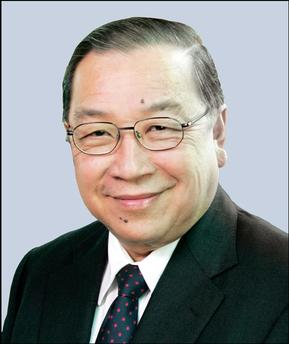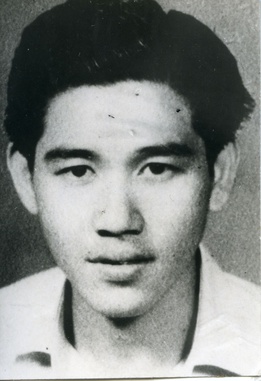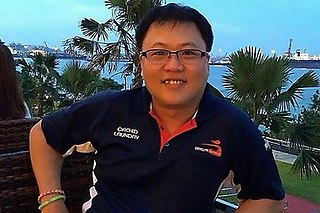
Capital punishment in Singapore is a legal penalty. Executions in Singapore are carried out by long drop hanging, and usually take place at dawn. Thirty-three offences—including murder, drug trafficking, terrorism, use of firearms and kidnapping—warrant the death penalty under Singapore law.
Woo Bih Li is a Singaporean lawyer who has been serving as a judge of the Supreme Court of Singapore since 2003.
Tay Yong Kwang is a Singaporean judge of the Supreme Court. He was first appointed Judicial Commissioner in 1997, appointed Judge in 2003, and appointed Judge of Appeal in 2016. He was noted for being the presiding judge in several notable cases that shocked the nation and made headlines in Singapore. He was most recently re-appointed for a further two year term on the Court of Appeal from 3 September 2024.

Lai Kew Chai was a Singaporean judge and the longest-serving member of the Supreme Court Bench, having served for almost 25 years as a Judge.
Hri Kumar Nair is a Singaporean lawyer and former politician who has been serving as Judge of the High Court of Singapore since 2023. A former member of the People's Action Party, he was the Member of Parliament representing the Thomson division of Bishan–Toa Payoh GRC between 2006 and 2015. He was also a former Deputy Attorney-General of Singapore between 2017 and 2023.
Choo Han Teck is a Singaporean judge of the Supreme Court. He was formerly a lawyer before his appointment to the court as a judge. It was revealed in 2021 that Choo was one of the defence lawyers representing Adrian Lim, the infamous Toa Payoh child killer who was executed in 1988 for charges of murdering a girl and boy as ritual sacrifices. In 1994, Choo also defended Phua Soy Boon, a jobless Singaporean who was hanged in 1995 for killing a moneylender.

Lim Ban Lim was a Singaporean gangster and outlaw who killed a police officer and stole at least $2.5 million before he was shot and killed at the age of 32. Lim became one of the country's most wanted fugitives after shooting and wounding a police officer during an altercation in May 1965. After shooting dead another police officer in July 1968, Lim fled the country, with local authorities offering a $17,000 bounty in their search for him. He evaded capture until 1972, when he returned to Singapore and was killed by the Singapore Police Force.

Known as the Gold Bars triple murders, on 29 December 1971, 55-year-old businessman and gold bar smuggler Ngo Cheng Poh, together with his two employees 57-year-old Ang Boon Chai, and 51-year-old Leong Chin Woo, were murdered by a group of ten men. The group had also robbed the three men of 120 gold bars worth $500,000. The robbery-murder was masterminded by 31-year-old Andrew Chou Hock Guan, an air cargo supervisor who acted as a middleman for Ngo to smuggle gold onto the flights from Singapore into Vietnam, before he decided to commit the robbery due to an event that led to the deterioration of Chou's ties to the gold syndicates.
Galing Anak Kujat is a convicted robber and a native Malaysian of Iban descent who came from Sarawak, Malaysia. He was best known to be the accomplice of Kho Jabing, a convicted murderer who also came from Malaysia and was known for his years-long battle against the death penalty in Singapore. Galing and Kho were both involved in the 2008 robbery and murder of mainland Chinese national and construction worker Cao Ruyin in Singapore. Initially facing a murder charge and possible execution, Galing was eventually imprisoned and jailed for robbery with hurt.

The Kallang River body parts murder was a murder and dismemberment case that occurred in Singapore. The case earned its name due to the body parts of the victim, 22-year-old Liu Hong Mei, being found disposed in Kallang River. In this case, Liu's 50-year-old supervisor, Leong Siew Chor, used a towel to strangle her to death, and he also severed her body into seven pieces - mainly her head, upper torso, lower torso, legs and feet - before disposing them in Kallang River and other locations in Singapore.

Leslie Khoo Kwee Hock is a criminal from Singapore who was convicted of the murder of his Chinese girlfriend Cui Yajie, with whom he had an extra-marital affair. Khoo, who had previously been criminally convicted for cheating and forgery, argued with his girlfriend in a car on 12 July 2016. The argument turned violent and Khoo strangled Cui in a moment of anger. Later, Khoo took Cui's corpse to a forest in Lim Chu Kang, where he burned the body for three days before he was arrested on 20 July 2016.
On 26 August 1996, at a flat in Bedok Reservoir Road, 25-year-old Jimmy Chua Hwa Soon, an army sergeant of the Singapore Armed Forces (SAF), brutally slashed his 39-year-old sister-in-law Neo Lam Lye and four-year-old nephew. While the boy survived the attack, Neo died as a result of 109 stab and slash wounds on her body. Chua was arrested five hours after the cruel attack, and he admitted to the killing, revealing that he had an affair with Neo ten years prior to the murder. Although Chua put up a defence of diminished responsibility against the charges of attempted murder and murder, the High Court found him guilty of murder and sentenced him to death. The Court of Appeal's subsequent ruling of Chua's case became a notable legal case report which emphasized on the requirements to find a person liable to the defence of diminished responsibility against a criminal charge in Singapore.

Life imprisonment is a legal penalty in Singapore. This sentence is applicable for more than forty offences under Singapore law, such as culpable homicide not amounting to murder, attempted murder, kidnapping by ransom, criminal breach of trust by a public servant, voluntarily causing grievous hurt with dangerous weapons, and trafficking of firearms, in addition to caning or a fine for certain offences that warrant life imprisonment.

The Pulau Senang riots was a case of armed rioting and murder that happened at the Singaporean island of Pulau Senang, where a reformative prison settlement was operated by the government of Singapore to imprison and rehabilitate secret society members, as well as to avoid prison overcrowding at Changi Prison. The settlement first opened in 1960, and had seen bouts of success in reforming many gang members and allowing them to rejoin society.
On 13 April 2015, inside their condominium in Choa Chu Kang, Singapore, 26-year-old motion graphics designer Ng Yao Cheng was attacked and stabbed to death by his youngest brother during an argument. The suspect, 21-year-old polytechnic graduate Ng Yao Wei, was arrested and charged with murder. It was revealed through investigations and trial that Ng Yao Wei had been relentlessly abused by his older brother and this long-standing resentment culminated into the stabbing. After it came to light through psychiatric assessments that Ng was suffering from depression at the time of his brother's murder, Ng's murder charge was reduced to manslaughter and he was sentenced to seven years' imprisonment on 19 September 2016.








